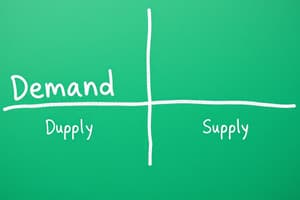Podcast
Questions and Answers
What is the main purpose of incentives in economic decision-making?
What is the main purpose of incentives in economic decision-making?
- To create competition among firms
- To ensure fair distribution of wealth
- To motivate individuals and firms to make choices (correct)
- To enhance government regulations
What does efficiency in economics primarily refer to?
What does efficiency in economics primarily refer to?
- Ensuring government control of markets
- Maximizing output from available resources (correct)
- Balancing income among different social classes
- Achieving equal economic opportunities
How do markets contribute to economic activity?
How do markets contribute to economic activity?
- By eliminating competition among firms
- By ensuring full employment for workers
- By regulating prices through government intervention
- By coordinating the distribution of resources (correct)
Which concept emphasizes the importance of fairness in resource distribution?
Which concept emphasizes the importance of fairness in resource distribution?
What do graphs and diagrams primarily help economists to do?
What do graphs and diagrams primarily help economists to do?
What is the fundamental economic problem?
What is the fundamental economic problem?
Which aspect does microeconomics primarily focus on?
Which aspect does microeconomics primarily focus on?
What does market equilibrium represent?
What does market equilibrium represent?
Which branch of economics involves value judgments?
Which branch of economics involves value judgments?
Which model is used in macroeconomics to predict economic fluctuations?
Which model is used in macroeconomics to predict economic fluctuations?
What concept describes the value of the next best alternative forgone?
What concept describes the value of the next best alternative forgone?
Which of the following is a key concept in analyzing firm behavior?
Which of the following is a key concept in analyzing firm behavior?
What is the primary focus of environmental economics?
What is the primary focus of environmental economics?
Flashcards
Incentives
Incentives
Motivations that encourage choices.
Economic Efficiency
Economic Efficiency
Getting the best possible outcomes from resources.
Equity
Equity
Fair distribution of resources.
Markets
Markets
Signup and view all the flashcards
Property Rights
Property Rights
Signup and view all the flashcards
Economics Definition
Economics Definition
Signup and view all the flashcards
Microeconomics Focus
Microeconomics Focus
Signup and view all the flashcards
Macroeconomics Focus
Macroeconomics Focus
Signup and view all the flashcards
Scarcity
Scarcity
Signup and view all the flashcards
Opportunity Cost
Opportunity Cost
Signup and view all the flashcards
Positive Economics
Positive Economics
Signup and view all the flashcards
Normative Economics
Normative Economics
Signup and view all the flashcards
Market Equilibrium
Market Equilibrium
Signup and view all the flashcards
Study Notes
Introduction to Economics
- Economics is the social science that studies how societies allocate scarce resources.
- It examines how individuals, businesses, and governments make choices to satisfy their needs and wants.
- The fundamental economic problem is scarcity: unlimited wants and needs but limited resources.
- Economics studies various phenomena such as production, distribution, and consumption of goods and services.
Microeconomics
- Microeconomics focuses on the behavior of individual economic agents such as consumers, firms, and markets.
- It analyzes individual markets, supply and demand, and pricing mechanisms.
- Key concepts include supply, demand, elasticity, market structures (competitive, monopoly etc.), production, cost, and revenue.
- Consumer choice theory examines how consumers make decisions based on their preferences and budget constraints.
- Firm behavior focuses on how firms make decisions to maximize profits given their costs and output.
- Market equilibrium occurs where supply and demand intersect, determining the market price.
- Analyzing market failures, such as externalities and public goods, is also a crucial aspect of microeconomics.
Macroeconomics
- Macroeconomics studies the overall performance of the economy.
- It analyses the aggregate variables such as inflation, unemployment, economic growth, and business cycles.
- Key macroeconomic models involve aggregate demand and aggregate supply.
- Government policies, such as monetary and fiscal policies, are major tools used to manage the economy.
- Fiscal policy deals with government spending and taxation.
- Monetary policy affects interest rates and money supply.
- Understanding economic indicators such as GDP, inflation rate, and unemployment rate is essential in macroeconomics.
- Macroeconomics models seek to explain and forecast the fluctuations in output, prices, and employment.
Branches of Economics
- Positive economics describes the way the economy works and makes factual predictions.
- Normative economics deals with value judgments and what ought to be.
- Development economics studies the economic growth and development of countries.
- Environmental economics examines the economical impact of environmental issues.
- Behavioral economics incorporates psychological factors into economic models.
Fundamental Economic Concepts
- Scarcity is the fundamental economic problem.
- Opportunity cost is the value of the next best alternative forgone when making a choice.
- Incentives motivate individuals and firms to make choices.
- Efficiency is maximizing output from available resources.
- Equity is achieving a fair distribution of resources and outcomes.
- Markets coordinate economic activity.
- Property rights are important for individual decisions.
- Economic systems vary in how they allocate resources (e.g., capitalist, socialist).
- The circular flow of income illustrates the flow of goods, services, and money within an economy.
Tools of Economic Analysis
- Graphs and diagrams help visualize economic relationships.
- Models simplify complex systems for analysis.
- Statistical methods are used to analyze data and draw conclusions.
- Mathematical equations and functions explain economic situations.
Modern Economic Thought
- Advances in economic theory explain and predict complex phenomena.
- Insights from behavioral economics challenge traditional economic assumptions.
- Modern economic theory incorporates factors such as uncertainty, information asymmetry, and social interactions.
Studying That Suits You
Use AI to generate personalized quizzes and flashcards to suit your learning preferences.
Description
This quiz explores fundamental concepts of economics and microeconomics. It covers how societies allocate resources, the behavior of individual economic agents, and key principles like supply, demand, and market structures. Test your understanding of how choices are made in both personal and business contexts.




